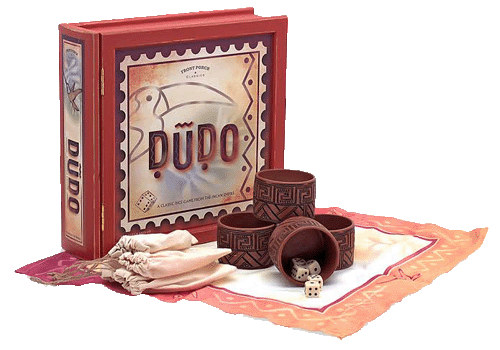Dudo
Dudo is a popular dice game mainly played in various Latin American Countries including Chile, Peru and Bolivia. The game is also known as Pico, Cacho, Cachito and Perudo. Dudo is a specific form of Liar's Dice, a family game collection having many variants. It takes at least two players to play the game. However, it can also be played by more than two individuals. The gameplay involves guessing the correct number of dice placed under small cups. A player loses one die if he or she loses a round. The player who succeeds to keep at least 1 die at the end of the game becomes the winner.
Gameplay
The game starts with each player having a cup and five dice. Players use their cups to shake the dice
and conceal them from others. All the players take their turns to roll a die, depending on their sitting
order. First, a die is rolled to decide which player will begin the game. Then, each individual shakes
the dice in his or her cup and keeps the dice hidden from others. Next, the first player guesses the
minimum number of dice showing a specific number. For example, the player may say that at least
four dice are showing a 5. Once the player has guessed a number, the second player has to raise,
spot or call on the announcement. The game always advances in a clockwise manner.
 Raise: A player can increase the die number ("four fives" to "four sixes") or the least number of dice
("four fives" to "five fives"). He or she may also increase both at the same time.
Raise: A player can increase the die number ("four fives" to "four sixes") or the least number of dice
("four fives" to "five fives"). He or she may also increase both at the same time.
There is another form of "Raise" in which the player reveals a specific number of dice on the table.
The rest of the dice are kept concealed in the cup. A raised bet is made depending on the revealed
dice. These dice remain in play for the rest of the game.
Call: A player calls when he or she wants to challenge the truthfulness of the previous player's call.
All the players have to show their dice after a call and if the player has guessed wrong, he or she
loses a die. But, if the call is correct, the challenged player has to lose a die. The player who lost a die
in the call starts a new round and the game goes on until there is only one player remaining with a
die.
Spot On: A player calls a spot on when he or she is sure about a guess. So, when a player calls a spot
on, the number or the face value of the dice will be absolutely right when the other players reveal
their dice. A player can win a die for calling a correct spot on; however, he or she loses one die if the
call is incorrect.
Pass: Players have the option of passing if they have 5 dissimilar dice in play. If a player passes, the
next player has to raise or call a spot on. He or she can also call the pass in case it is believed to be a
bluff.